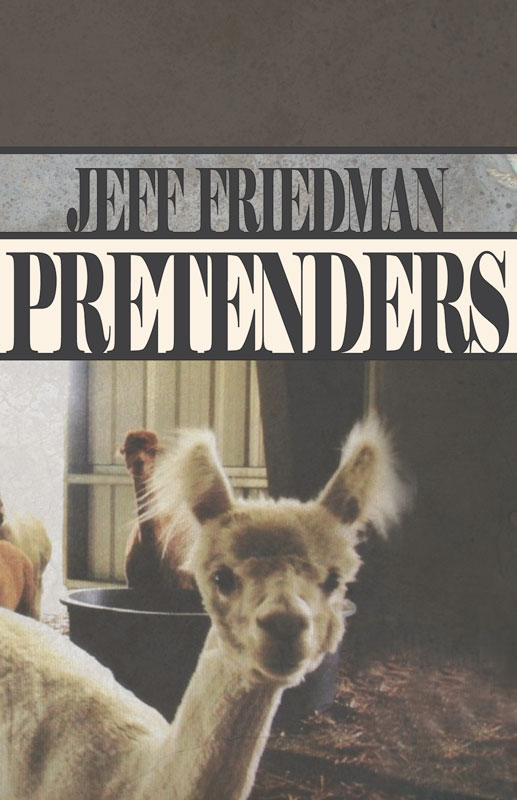
Carnegie-Mellon University Press, 2014
ISBN: 978-0-88748-579-4
Buy Here
Read Poems
The poems in Jeff Friedman’s collection, The Pretenders, glide seamlessly between the real and the surreal, the humdrum and the absurd, the metaphysical and the personal, carrying the reader along with their mesmerizing and incantatory power. I found myself reading them one after another without pause. Jeff Friedman is clearly one of the more intoxicating voices in American poetry today.
—Nin Andrews
Jeff Friedman writes, “somebody snuffs a crow / prophesying a century of famine.” Well, Jeff better watch his back, because it’s prophecy—goofy, fabulist, allegorical, comic, hauntingly honest, and grave as hell—that Friedman’s up to in Pretenders. This is his best book yet.
—Ross Gay
In Pretenders the poems, deepened into elementals, are, as always political—of dictators, prophesiers, bankers and brokers, secret anti-Semites, people in love and not so much in love. The old humor is intact, and the conversational ease has lifted into fable. I love this book!
—Carol Frost
Reviews
If I could, I would transform Friedman into a Polish poet with Polish citizenship for being faithful to Polish poets; for the great poems in his new collection; for defending “the kingdom without a limit.
—Ewa Chrusciel, Poetry International
Necessity, emergency, crisis, imagination are exponentially alive in Pretenders. It is a profoundly moving book. Friedman’s leaps from real to surreal intensify his vision of a fractured and corrupt society. Capitalism is the engine that is running all of us down. Money is the real serpent in the Garden of Eden. Pretenders is Jeff Friedman’s best book yet and belongs among the best books of this decade.
—Walter Bargen, New Letters (pdf version)
Each poem in Jeff Friedman’s sixth collection, Pretenders, delights with its linguistic and imaginative invention. The opening poem, “Mud,” sets the tone for the work that follows. From the mysterious first lines—“Out of the river, mud climbed/broken embankments, crooked staircases/gleaming hulls, the corpses of cows/ the skulls of cares” (1-4)—through the more nurturing mid-section—“Mud baked our bread. / It spoke a thousand tongues/translated our deepest needs into simple sentences” (12-14)—“Mud” displays Friedman’s characteristic piling on of images so engaging it’s easy to lose track of the somber subtext culminating in the closing line: “When we looked up, even the sun was mud…” (25)
—Kathleen Aguero, Solstice Literary Journal